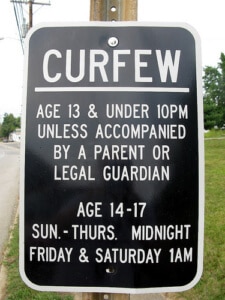
Maryland is a strict state when it comes to juvenile curfew laws. Defined as any individual under 17 years of age, juveniles are not allowed out unsupervised beginning at 11:59 PM on Friday and Saturday nights, and ending at 5:00 AM. During the week, the curfew is even earlier at 10:00 PM. While there are a number of exceptions, juveniles who are found out after curfew time can be stopped by police, and their name, address, and contact information for their parents will be gathered. The juvenile will receive a written warning, and then the parents of the juvenile receive a written warning in the mail from the Chief of Police. If the juvenile is found breaking curfew a second time, the juvenile can be brought into custody and the parents will be contacted.
There are a number of exceptions to the Maryland juvenile curfew laws, in general to protect the freedom of those under 17 years old. If the juvenile is accompanied by a parent, legal guardian, or adult specified by the parents to be supervising the juvenile, they can be out after curfew. A juvenile can be out until 12:30 AM if they are on an errand for a parent. The juvenile can also be outside at anytime, as long as they are on their own property.
The first amendment of the United States constitution protects the rights of every citizen, regardless of age. The first amendment allows the freedom to practice religion, to assemble, and to speak freely. But juveniles out after curfew have to do more than cite their first amendment rights if they are caught unsupervised. To protect their first amendment rights, juveniles must provide written documentation to the Chief of Police or otherwise designated individual before the event, outlining where they will be, why they will be out after curfew, and what they will be doing during the outing. The documentation must also provide an address and contact information for the juvenile’s parents or legal guardian.
If a juvenile is on a direct route home without detours, it is possible to be out up to one hour after the end of an event. This can include attending a movie and driving right home, going to a school dance, attending church, or volunteering at an event. Juveniles must be making an effort to get home within the hour time limit after the event, and those found hanging around can be deemed out after curfew.
While there are specific laws that may restrict the hours of when a juvenile can be working, the curfew laws in Maryland make an exception for juveniles who are legally employed. The juvenile must carry a certified card of employment that identifies where the juvenile works, the hours scheduled, the name and address of the juvenile. This card is issued by the Chief of Police, and will need to be renewed every six months in order to be valid.
If the juvenile is legally married, they have the right to be out after curfew.
It’s important to remember that police do not have to suspect any wrongdoing in order to question a juvenile who is out after curfew. A written warning can be given, simply for being out after hours if the juvenile does not meet any of the above exceptions.
Lawmakers tout that these measures are not only to keep kids off the streets late at night, but to keep them safe as well. Teen drivers are much more likely to be involved in car accidents after 9:00 pm.
Parents are responsible for their children, and Maryland curfew laws make this clear. If a juvenile is found out after curfew and the parent can’t be reached, the Department of Social Services may be called to come and pick up the juvenile. If a parent knowingly allows their child to break curfew, this is a civil offense, and they can be fined $50 for a first offense, $100 for a second offense, and $250 for subsequent offenses. In addition, if a parent does not show up within an hour after being called, they will need to pay for the staff who has to watch the child until the parent arrives. This amount is variable, as the salary of the individual staying with the child is part of the calculation.
Filed Under:
Comments are closed.